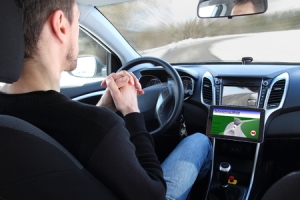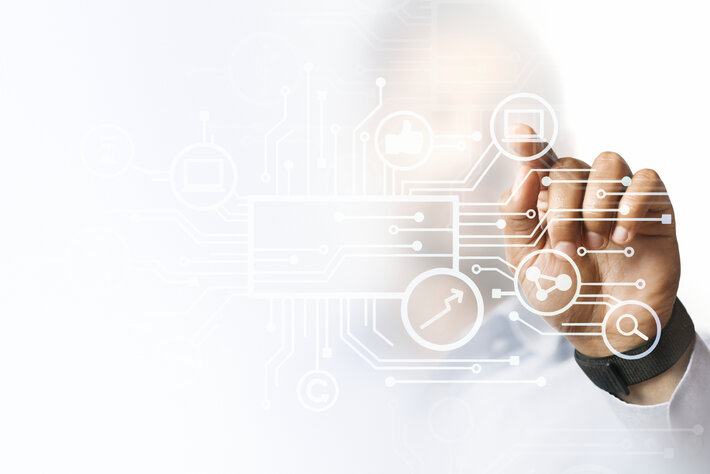Artificial Intelligence (AI) is dividing the world. Heralding the fourth industrial revolution, is AI a force for good, as predicted by PwC boosting the UK economy by 10% over the coming decade, or is it the beginning of the end for a raft of manual and knowledge workers?
Given the catch-all nature of technologies apparently falling within the AI definition, it is hard to validate any predictions right now. AI is not some magic wand that will eradicate manual tasks or transform day-to-day operations – it is simply another step forward in harnessing huge data resources to better understand the business and hence drive new efficiencies. And that is where the problem lies.
Right now, organisations are still struggling to gain insight from existing data sources – where are the robust and efficient data gathering processes that enable businesses to access insight more quickly and effectively? Where is the implicit trust in data? Organisations need to take huge steps forward in data confidence and trust before any of these intuitive tools, from machine learning onwards, can gain any realistic foothold within day-to-day corporate operations.
Here Peter Ruffley, chairman at Zizo, considers the importance of Digital Transformation (DX) and creating a data-driven culture to prepare businesses for an AI enabled world.
Intelligent automation
The speed with which artificial intelligence (AI) has permeated everyday life has taken some by surprise. While we are still some distance from the self-driving cars eradicating road traffic accidents; bots leveraging X-Rays, MRI scans and medical research to transform diagnostics; even robot surgeons, advances in machine learning, speed recognition and visual recognition technology are already embedding AI in everyday activities.
 From the Internet of Things (IoT) devices used within retail supply chains to minimise food wastage to the translation engines transforming global communication, the concept of intelligent automation is becoming familiar. Look ahead and the promise of AI – if fulfilled – will transform every aspect of life. And that’s before the killer drones rise up!
From the Internet of Things (IoT) devices used within retail supply chains to minimise food wastage to the translation engines transforming global communication, the concept of intelligent automation is becoming familiar. Look ahead and the promise of AI – if fulfilled – will transform every aspect of life. And that’s before the killer drones rise up!
However, while every headline paints a picture of a machine-dominated future, a world where by 2025, the work of 150 million knowledgeable workers will be completed by cognitive robots, right now the majority of organisations have no clear understanding of, or strategy for effectively using AI in the future. In fact, they are nowhere near.
Cultural shift
So how do we get there? How can a business be ready for the intuition led operations that can and will be driven by AI? The fundamental shift will be achieving a cultural willingness to trust and believe the data. The whole premise of AI is that technology is trusted to do the job, based on the information provided. If that information is inaccurate or incomplete, the AI cannot perform effectively – or maybe even at all.
Certainly, complex diagnostic processes will be less than convincing if the AI is provided with a limited subset of essential patient data. Fighter pilots will be reluctant to take off in a plane that is using an AI-based predictive maintenance system if they lack complete confidence in the quality of the information.
But even less ground breaking developments will depend on high quality data. And that is the challenge. The transition from where we are today to relying implicitly in AI is going to be huge. Quite simply, when an organisation today lacks the confidence in its information resources to even take data driven decisions, it is hardly going to embrace AI, a model predicated on data driven activity. Any business that is not already making decisions based on information that is trusted implicitly is going to struggle to embrace AI at any level.
Digital Transformation (DX) foundation
Those organisations able to follow a digital transformation process and truly embrace data driven decision making will be well placed to explore the amazing opportunities AI will deliver. From predictive models and regression algorithms, that can accurately predict shopping patterns and enable retailers to put the right store and security staff in place; to fully automated tills, discounting rates automatically created based on stock availability, even web analysis and product affinity, AI will transform every aspect of the retail model.
Indeed, trials are already underway of checkout-less stores, using sensors and cameras to monitor customer picks and automatically debiting accounts via Smartphones. The future of retail is advanced intelligent.
But the contrast to current operations is stark. This is not a one-step evolution. Just consider the wealth of current data that is not being effectively captured and deployed. Real time supply chain optimisation in response to actual consumer demand should be a given considering the existing depth of EPOS information and inventory data.
Yet a number of supermarkets still rely on individuals to manually check the shelves several times a day in every single store to highlight any gaps in stock availability. A report is created, sent to head office and, eventually, the stock arrives.
Yet the data exists. Why are these retailers not tracking sales patterns across each store in order to predict local demand? Why are they not factoring in seasonality, demand variation by day of week and restocking accordingly? Improved insight can transform stock accuracy, minimise stock outs and improve the customer experience.

But right now, without a willingness to take the next step – namely record stock availability against sales and embrace data driven decision making, the retailer is stuck with an inaccurate, inefficient manual approach and is a long way from exploring a truly automated business model.
Conclusion
And this is the key. Looking too far ahead is a mistake. Forget the killer drones, for now at least. Put the robot surgeons to one side. AI is on the way, no doubt, but there are several steps that organisations must take to get anywhere near AI in practice. And effective utilisation of existing data sources is step one.
Right now, despite the board level commitment to DX strategies, how many organisations can truly claim to be data driven? To have a user base with implicit trust in the data and a culture that has confidence in data led decisions? Without that essential foundation, the scope of possibilities of using any type of AI or predictive or machine learning is going to be vastly reduced. AI may herald the fourth industrial revolution; but successful deployment of AI will demand fundamental cultural change and an entirely different attitude to, and trust in, data.
The author of this blog is Peter Ruffley, chairman at Zizo
Comment on this article below or via Twitter: @IoTNow_OR @jcIoTnow










